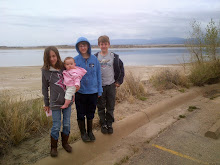Many home school families struggle with how to teach or incorporate music and art into their day. There seems to be little time and sometimes lack of training can be an issue. Here are some thoughts that may help.
Music history has been broken down into eras. The composers and styles of these eras can be linked to historical time frames. Where writing and reading sometimes fail to describe a particular event or time frame adequately, music can step in and build a brain picture.
Here are some historical eras to start with:
450-1450 Middle Ages: music was involved in the spread of the Church, Islam was being spread and much of its music was influential at the time, Europe was beginning to develop
Music Styles: recorder, medieval music, monophonic music (Gregorian chant)
Composers: Hildegard von Bingen, Moniot d'Arras, Guillaume de Machaut1450-1600 Renaissance: music was viewed as a cultural growth, this time was considered a rebirth, a new world was being formed, science and the arts were beginning to take a new form
Music Styles: madrigals, toccata, prelude, dance music
Composers: Claudio Monteverdi, Giovanni Pierluigi da Palestrina
Composers: Claudio Monteverdi, Giovanni Pierluigi da Palestrina
1600-1750 Baroque: music became involved in the "experimentalism" of the new modern world
Music Styles: voice and instruments together, basso continuo
Composers: Claudio Monteverdi, Henry Purcell, Antonio Vivaldi, George Frideric Handel, Johann Sebastian Bach1750-1825 Classical: Industrial Revolution, Enlightenment, republican government, nature in the arts
Music Styles: Piano solos, Sonatas
Composers: Franz Joseph Haydn, Wolfgang Amadeus Mozart, Ludwig Van Beethoven1825-1900 Romantic: nationalism, exotics, science and mysticism in music
Music Styles: program music
Composers: Franz Schubert, Giuseppe Verdi, Clara Schumann, Richard Wagner, Franz Liszt, Johannes Brahms, Peter Ilich Tchaikovsky, Antonin Dvorák, Richard Strauss, Claude Debussy 1900-present 20th Century: age of technology
Music Styles: World Music, Pop Music, Improv
Composers: Béla Bartók, Igor Stravinsky, Duke Ellington, Aaron Copland, Leonard Bernstein~~~~~~~~~~~~
If this doesn't help, I've broken down some of the popular units that may be studied and added some musical compositions/composers that could be incorporated:
~~~~~~~~~~~~
Science:
Astronomy- Gustav Holst: The Planets Suite
Animals- Camille Saint-Saëns: Carnival of the Animals
Oceans and Seas- Henry Kimball Hadley: The Ocean, Camille Saint-Saëns: Carnival of the Animals: Aquarium
Weather/Seasons- Antonio Vivaldi: The Four Seasons
Bugs/Insects- Nikolai Rimsky-Korsakov: Flight of the Bumble Bee
Plants- Jonas Forssell: I begynnelsen (The Kingdom of Plants),
Lakmé: The Flower Duet (BBC Concert Orchestra),
Don Quixote: Flower Waltz
Historical Events and People:
Westward Expansion- Aaron Copland
1941 Seige of Leningrad- Dmitri Shostakovich: Symphony No. 7 in C major, Op. 60
Duke of Wellington- Ludwig van Beethoven: Wellington's Victory
War of 1812- Pyotr Ilyich Tchaikovsky: 1812 Overture
Ottoman Empire- Pyotr Ilyich Tchaikovsky: Marche Slave
Hiroshima- Krzysztof Penderecki: Threnody to the Victims of Hiroshima
Mount St. Helens- Alan Hovhaness: Symphony No. 50
Creation- Joseph Haydn: The Creation
I'd love to have comments on any others you can think of!! This is definitely not an exhaustive list!
Some books and sites I've found helpful:
~~~~~~~~~~~~~~~~~~~~~~~~~~~~~~~~~~~~~~~~~~~~~~~~~~
Greg's Science Song Music (just for fun)
Classical Music Lapbook (squidoo.com)



1 comment:
Dallas Symphony Orchestra's "Forecast: Music" Repertoire
Could be used for a weather themed unit study:
Grofé - “Cloudburst” from Grand Canyon Suite
Debussy – “Clouds” from Nocturnes
Debussy – “Dialogue of the Wind and the Sea” from La Mer
Tchaikovsky – “Waltz of the Snowflakes” from The Nutcracker
Strauss – Thunder and Lightning Polka
Vivaldi – “Autumn,” mvt. III, from The Four Seasons
Grieg – In the Hall of the Mountain King
Copland – Appalachian Spring
Gershwin – Cuban Overture
Post a Comment